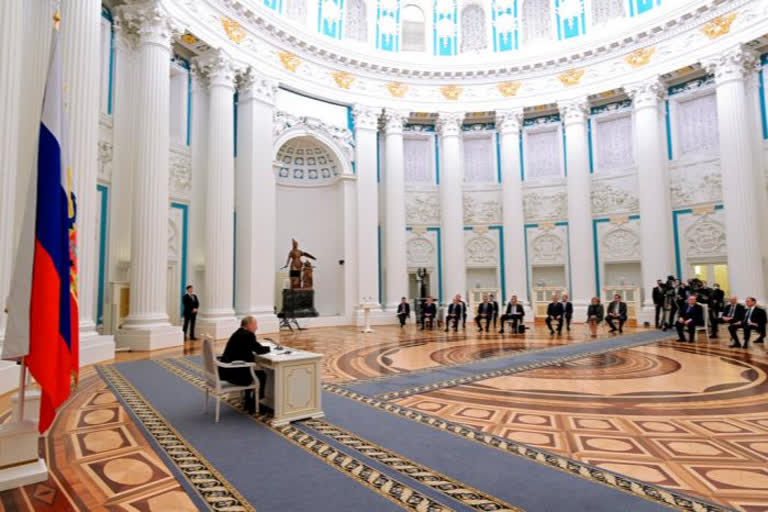Moscow: Russia set the stage for a quick move to secure its hold on Ukraine's rebel regions on Tuesday with new legislation that would allow the deployment of troops there as the West prepares to announce sanctions against Moscow amid fears of a full-scale invasion. The new Russia bills, which are likely to be quickly rubber-stamped by the Kremlin-controlled parliament, came a day after President Vladimir Putin recognized the independence of the regions in eastern Ukraine. The legislation could be a pretext for a deeper move into Ukrainian territory as the U.S. and its allies have feared. Quickly after Putin signed the decree late Monday, convoys of armored vehicles were seen rolling across the separatist-controlled territories. It wasn’t immediately clear if they were Russian.
Russian officials haven't yet acknowledged any troop deployments to the rebel east, but Vladislav Brig, a member of the separatist local council in Donetsk, told reporters that the Russian troops already had moved in, taking up positions in the region's north and west. Putin’s decision to recognize the rebel regions as independent states follows a nearly eight-year old separatist conflict that has killed more than 14,000 and devastated Ukraine’s eastern industrial heartland called Donbas. The latest developments and move by Putin were met with reprehension by many countries around the world. Ever since the conflict erupted weeks after Russia’s 2014 annexation of the Ukrainian Crimean Peninsula, Ukraine and its Western allies have accused Moscow of backing the separatists with troops and weapons, the charges it has denied, saying that Russians who fought in the east were volunteers. Putin’s move Monday formalizes Russia’s hold on the regions and gives it a free hand to deploy its forces there.
Draft bills that are set quickly sail through both houses of Russian parliament Tuesday, envisage military ties, including possible deployment of Russian military bases in the separatist regions. Several senior lawmakers suggested Tuesday that Russia could recognize the rebel-held territories in the Donetsk and Luhansk regions of Ukraine in their original administrative borders, including the chunks of land currently under the Ukrainian control. Ukraine’s President Volodymyr Zelenskyy sought to project calm, telling the country in an address overnight: “We are not afraid of anyone or anything. We don’t owe anyone anything. And we won’t give anything to anyone.” His foreign minister, Dmytro Kuleba, would be in Washington on Tuesday to meet with Secretary of State Antony Blinken, the State Department said.
“The Kremlin recognized its own aggression against Ukraine,” Ukrainian Defense Minister Oleksii Reznikov said on Twitter, describing Moscow’s move as a “New Berlin Wall” and urging the West to quickly slap Russia with sanctions. The White House responded quickly, issuing an executive order to prohibit U.S. investment and trade in the separatist regions, and additional measures — likely sanctions — were to be announced Tuesday. Those sanctions are independent of what Washington has prepared in the event of a Russian invasion, according to a senior administration official who briefed reporters on the condition of anonymity.
Also Read:United Nations Security Council to hold an emergency meeting today on Ukraine
Other Western allies also said they were planning to announce sanctions. British Prime Minister Boris Johnson said Tuesday the U.K. will also introduce “immediate” economic sanctions against Russia, and warned that Putin is bent on “a full-scale invasion of Ukraine ... that would be absolutely catastrophic." Johnson said Putin had “completely torn up international law” and British sanctions would target not just the regions of Donetsk and Luhansk but “Russian economic interests as hard as we can.” EU foreign policy chief, Josep Borrell, said that “Russian troops have entered in Donbas,” adding that “I wouldn’t say that (it is) a fully-fledged invasion, but Russian troops are on Ukrainian soil” and the EU would decide on sanctions later on Tuesday.
